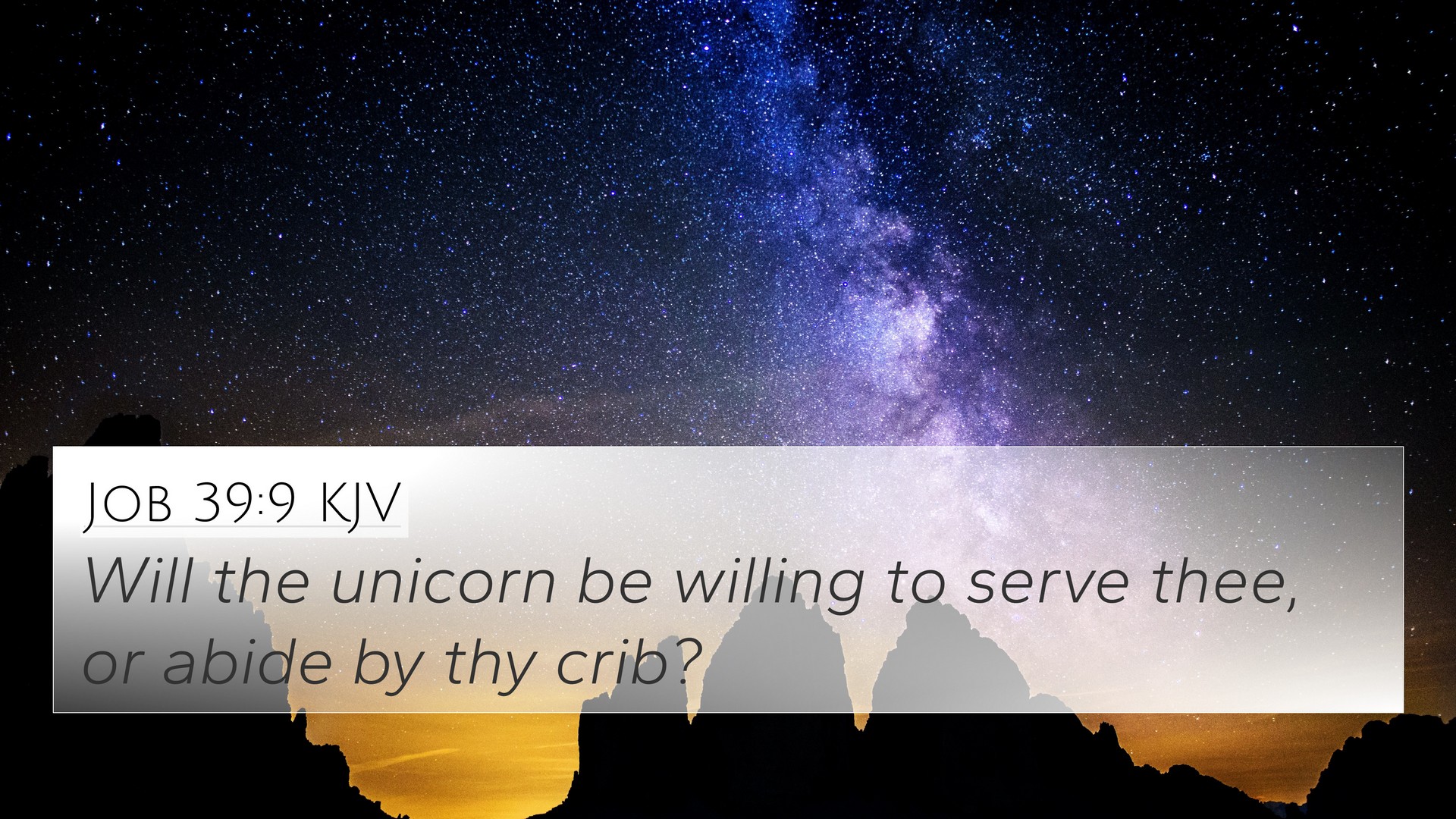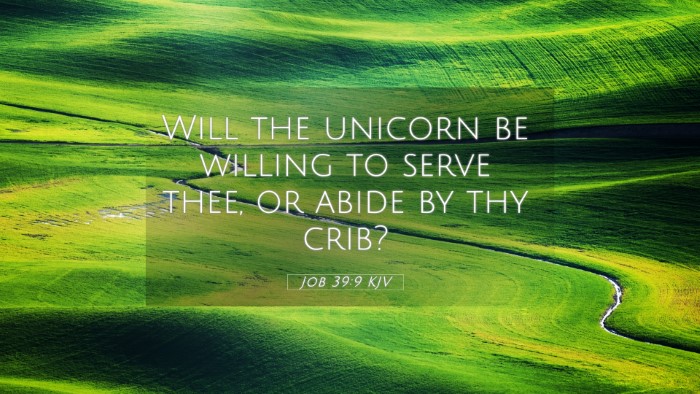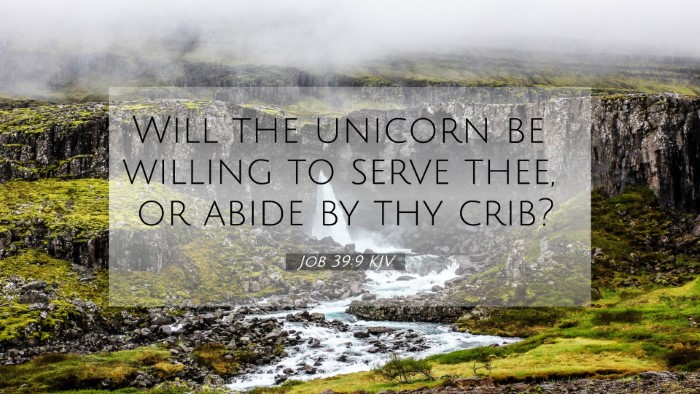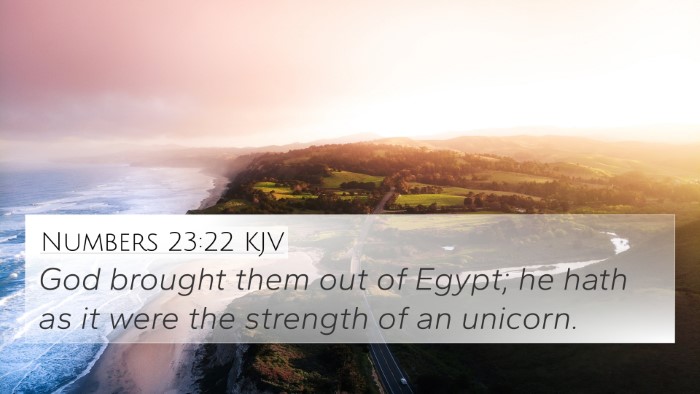Old Testament
Genesis Exodus Leviticus Numbers Deuteronomy Joshua Judges Ruth 1 Samuel 2 Samuel 1 Kings 2 Kings 1 Chronicles 2 Chronicles Ezra Nehemiah Esther Job Psalms Proverbs Ecclesiastes Song of Solomon Isaiah Jeremiah Lamentations Ezekiel Daniel Hosea Joel Amos Obadiah Jonah Micah Nahum Habakkuk Zephaniah Haggai Zechariah MalachiJob 39:9 Similar Verses
Job 39:9 Cross References
Will the unicorn be willing to serve thee, or abide by thy crib?
Uncover the Rich Themes and Topics of This Bible Verse
Listed below are the Bible themes associated with Job 39:9. We invite you to explore each theme to gain deeper insights into the Scriptures.
Job 39:9 Cross Reference Verses
This section features a detailed cross-reference designed to enrich your understanding of the Scriptures. Below, you will find carefully selected verses that echo the themes and teachings related to Job 39:9 KJV. Click on any image to explore detailed analyses of related Bible verses and uncover deeper theological insights.
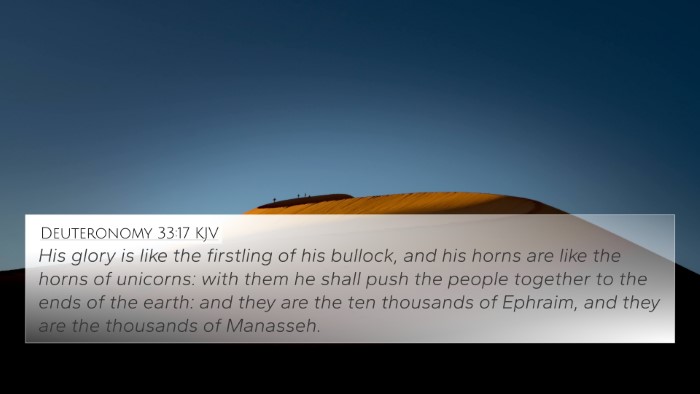
Deuteronomy 33:17 (KJV) »
His glory is like the firstling of his bullock, and his horns are like the horns of unicorns: with them he shall push the people together to the ends of the earth: and they are the ten thousands of Ephraim, and they are the thousands of Manasseh.
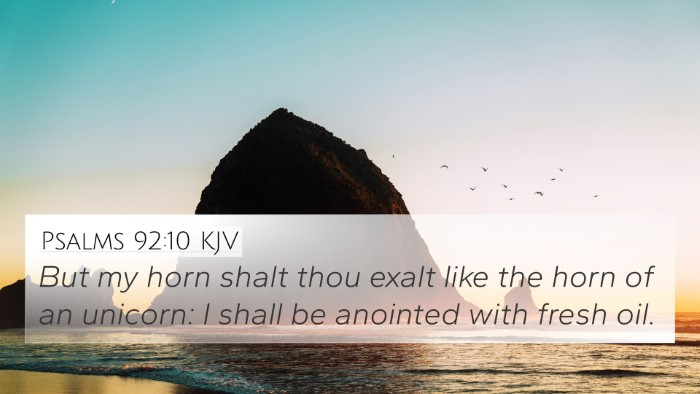
Psalms 92:10 (KJV) »
But my horn shalt thou exalt like the horn of an unicorn: I shall be anointed with fresh oil.
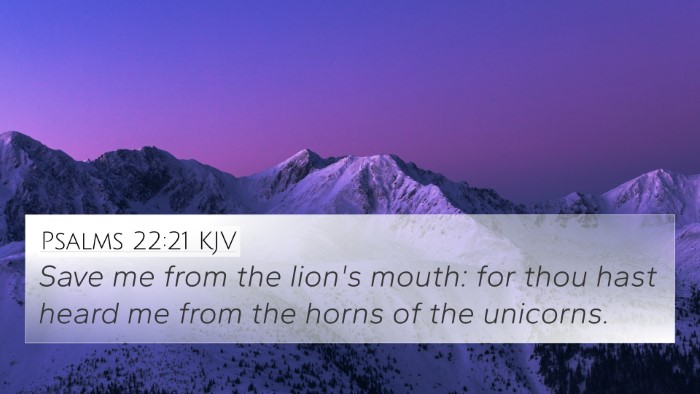
Psalms 22:21 (KJV) »
Save me from the lion's mouth: for thou hast heard me from the horns of the unicorns.
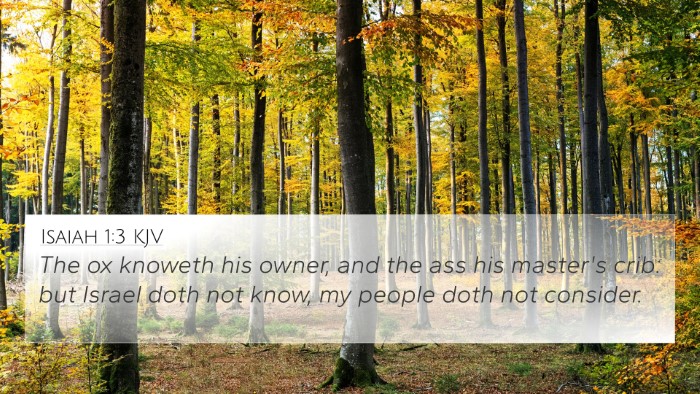
Isaiah 1:3 (KJV) »
The ox knoweth his owner, and the ass his master's crib: but Israel doth not know, my people doth not consider.
Job 39:9 Verse Analysis and Similar Verses
Understanding Job 39:9
Verse: Job 39:9 - "Will the unicorn be willing to serve thee, or abide by thy crib?"
This verse poses a rhetorical question about the unicorn, a creature often depicted in ancient texts and folklore. The context highlights God's sovereignty over creation and His intimate knowledge of the natural world, including its creatures.
Meaning Derived from Commentaries
Insights from Matthew Henry
Matthew Henry emphasizes the majesty of God in His creation. In asking whether the unicorn will serve, it points to the fact that even the most powerful creatures exist at God's command. The 'unicorn' symbolizes strength and untamed nature, suggesting that divine authority is recognized even among the most formidable of creatures.
Insights from Adam Clarke
Adam Clarke provides a linguistic commentary on the term 'unicorn', suggesting its possible identification with the wild ox or another strong animal. This exploration underscores the question of whether such powerful beings are inclined to submit to human authority, reinforcing the theme of divine versus human dominion.
Insights from Albert Barnes
Albert Barnes discusses the imagery of the unicorn as a metaphor for untamed strength and independence. The question asked not only stresses the creature's nature but also serves to illustrate the larger point of Job's situation: God's omnipotence compared to human limitations. In acknowledging that the unicorn does not easily submit, it reflects the broader divine governance over the natural world.
Cross-Referencing Related Bible Verses
Job 39:9 can be cross-referenced with the following verses:
- Psalms 104:25-26: Speaks of the vast sea and the creatures therein, reflecting God's creation and sovereignty.
- Isaiah 11:6: Describes a future peace among creatures, illustrating the ultimate dominion of God over nature.
- Job 40:15: Talks about Behemoth, another creature of strength, further emphasizing God's power over mighty beings.
- Proverbs 21:1: Illustrates God's control over the hearts of kings, analogous to his control over all creation.
- Luke 12:24: Jesus mentions how God feeds the ravens, highlighting His provision and authority over the animal kingdom.
- Job 38:4-5: God's questions to Job regarding the creation of the earth, showcasing His omniscience and creative power.
- Genesis 1:26-28: Refers to humanity's dominion over living things, connecting human authority to God's will.
- Ecclesiastes 3:19: States that all living beings share in mortality, reminding humans of their place in creation.
- Jeremiah 8:7: Discusses how even the stork knows her appointed times, focusing on created beings recognizing God’s authority.
- Psalms 148:7-10: Calls all creatures to praise the Lord, emphasizing God's ultimate authority in all of creation.
Thematic Connections
The verse encourages believers to reflect on the themes of:
- Divine Sovereignty: Recognizing God's authority over all creatures and the natural order.
- Creation's Response: How nature reflects the Creator's will and purpose.
- Human Limitations: Understanding our position in the hierarchy of creation, that we do not control all.
- Comparison and Contrast: The strength of the unicorn against the frailty of human effort.
Using Cross-References for Deeper Understanding
Understanding cross-references, such as Job 39:9, enhances our comprehension of Biblical texts. For effective study, consider the following tools:
- Utilizing a Bible concordance to find specific references and themes.
- Employing a Bible cross-reference guide for a structured approach to interlinking scriptures.
- Engaging in cross-references Bible study methods to explore relationships between verses.
- Considering Bible reference resources that offer insights into scriptural connections.
- Using bible chain references, linking verses in thematic chains for comprehensive analysis.
Conclusion
Job 39:9, through its probing question about the unicorn, invites us to realize the majesty of God's creation and His authority over it. It reminds us as believers of our position relative to divine sovereignty and strengthens our understanding of scriptural connections. By embracing the insights from public domain commentaries and utilizing cross-references, we deepen our appreciation for the Bible's coherence and the thematic interrelationships within its text.
